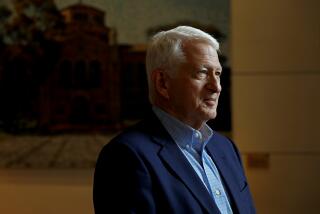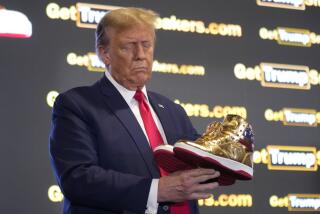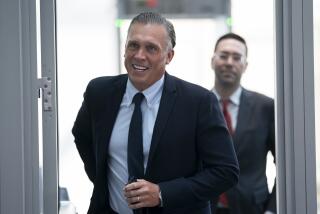Execs can’t win in testifying on Capitol Hill
- Share via
Reporting from Los Angeles and Washington — When Akio Toyoda, president of Toyota Motor Corp., testifies Wednesday before the House’s oversight committee about his company’s massive recall efforts, he’ll probably learn a lesson many other powerful top executives have figured out the hard way.
The televised hearing is theater, and the corporate chief is not the hero.
“The purpose of these hearings is to grill these people, to use them, essentially, as props to make a policy or political point. You are there to be a fish in a barrel,” said Jack Quinn, who as White House counsel for President Bill Clinton testified before Congress and now advises corporate clients on the fine art of being an easy target.
Quinn’s firm, Quinn Gillespie & Associates, is one of several with expertise in preparing congressional witnesses, evidence of the prevailing wisdom that a good hearing on Capitol Hill isn’t too bad -- but a bad hearing can haunt a company for years.
Along with lawyers and lobbyists, these consultants dispense advice both mundane (don’t drink too much water or you may have to excuse yourself) and strategic (don’t expose yourself to legal liability).
In conference rooms around Washington, chief executives who are far more accustomed to doing the grilling are grilled themselves in mock hearings in the days before their testimony. They often are counseled to reach out to lawmakers on the committee to try to “humanize” themselves. Their advisors whisper words such as “humility” and “restraint” and repeat something men and women at the top of their game often don’t like to hear.
“You’re going to get hurt. But if you only get hurt a little, you’re OK,” said longtime Washington attorney Robert Bennett, whose clients have included Clinton in the Monica Lewinsky affair and Enron Corp. “You can’t go in and win.”
But you can lose, crisis management experts said.
The cautionary tales loom large. In 1994, the seven executives of the Big Tobacco industry repeated one after the other that nicotine wasn’t addictive, a statement that was out of sync with science and public sentiment. In 2008, auto executives coming to Washington in search of a financial lifeline arrived via private jet. That image overshadowed nearly all other statements made in the hearing.
“It screamed arrogance,” said Quinn, who said his firm briefly was retained by Toyota before the firm discovered a conflict of interest. “You want people to think you understand people’s concerns. You want to come in and say, ‘Kids shouldn’t smoke.’ You want to be someone who gets it.”
In that category, experts place Edward Liddy, who had the unenviable task of testifying last year about why fallen insurance giant American International Group Inc. paid out millions in employee bonuses after accepting a massive government bailout.
Liddy stressed that he found the bonuses “distasteful,” but explained that AIG was contractually obligated to make the payments. He appealed to patriotism and said he was doing his best to prop up the company to repay taxpayers.
“Six months ago, I came out of retirement to help my country,” he testified.
He also mitigated some of the legislators’ anger by recounting the death threats against employees.
“He had some really stark, interesting lines,” said Yash Gupta, dean of the Carey Business School at Johns Hopkins University. “He connected with American values.”
Toyoda, who is nicknamed “The Prince” and is the grandson of the company’s founder, initially declined an invitation to testify before the House Committee on Oversight and Government Reform, which is investigating the recall of millions of vehicles because of a sudden acceleration problem. At least 34 deaths have been blamed on the malfunction.
Japan’s parliament does question witnesses and government officials, and Japanese reporters do grill executives at news conferences. But neither has the dramatic flair of a Capitol Hill hearing, said Daniel Sneider, a professor at Stanford University’s Shorenstein Asia-Pacific Research Center.
“They don’t seem to have the same confrontational political theater that we engage in, with the 12 senators looking down at one witness at the table,” Sneider said. “I’m fairly certain this will be a unique experience for Mr. Toyoda.”
The company would not comment on its efforts to prepare its president for his testimony, though a spokeswoman did confirm Toyota had retained Glover Park Group, a well-connected communications firm co-founded by former Clinton Press Secretary Joe Lockhart.
Experts said Toyoda’s advisors probably started prep work with intelligence gathering. An executive needs to know whether he or she has allies on the committee and exactly what the tone of the hearing will be. Then the witness often tries to reach out to lawmakers personally, either with a telephone call or personal visit.
“It’s harder to attack someone that you’ve met,” said Gene Grabowski, senior vice president at Levick Strategic Communications, a firm that has advised toy and pet food companies involved in recalls as well as other industries under federal investigation.
Grabowski said his next step would be to set up “the murder board,” a mock hearing that can last for hours and spares no one.
“You assemble six or seven of the meanest, sharpest people you have and they pretend to be members of Congress. They throw every insult, attack, harsh question they can,” Grabowski said. “You condition [the client] not to take the bait.”
Not all crisis management experts follow the “Sit there and take it” strategy. Jim McCarthy, president of CounterPoint Strategies, said he tells his clients to push back and make a case for their company’s actions and value.
“If you roll over, it becomes a trial,” he said. “And that’s a chief reason not to suffer the accusation. It hurts your brand and it confirms what regulators think of you.”
McCarthy pointed to recent testimony in which Goldman Sachs Chairman Lloyd Blankfein defended his company’s practice of hedging its risk on subprime mortgages. Blankfein got his point across, but also stole the spotlight.
Not all experts see that as a good thing.
“You are auditioning for a part you don’t want to get,” Bennett said. “You don’t want to be so brilliant that they call you back again and you become a poster boy for the auto industry’s problems.”
Toyoda appears to be taking the contrite approach. In an opinion piece published Tuesday in the Wall Street Journal, he acknowledged the company “didn’t listen as carefully as we should” to its customers. He plans to apologize in his opening remarks to the House committee, according to a statement submitted to the committee.
Committee Chairman Edolphus Towns (D-N.Y.) said he expected full cooperation from Toyoda and disputed the characterization of the hearing as a political theater.
“It’s not a situation where we want to beat up on anybody to score points. We want to make sure the safety issue is taken care of,” Towns said.
Toyoda will be joined by Department of Transportation Secretary Ray LaHood, David L. Strickland, the head of the National Highway Traffic Safety Administration, and people whose family members have died in car crashes blamed on the unintended-acceleration problem.
Toyoda, who went to business school in the U.S. but is not fluent in English, plans to use a translator to answer questions. He plans to read his opening statement in English, committee staff said.
That statement sets the tone and often writes the headline, experts noted, which is why many executives use it to announce some proactive new plan, inquiry or other piece of news that will demonstrate the company’s response to a problem. It’s also a chance to establish credibility, Bennett said.
“They always start out with ‘I’m pleased to be here,’ and I always cross that out,” he said. “You’re not pleased to be there. Who wants to be there?”
walter.hamilton@
latimes.com
Times staff writer Jim Puzzanghera in Washington contributed to this report.
More to Read
Inside the business of entertainment
The Wide Shot brings you news, analysis and insights on everything from streaming wars to production — and what it all means for the future.
You may occasionally receive promotional content from the Los Angeles Times.











